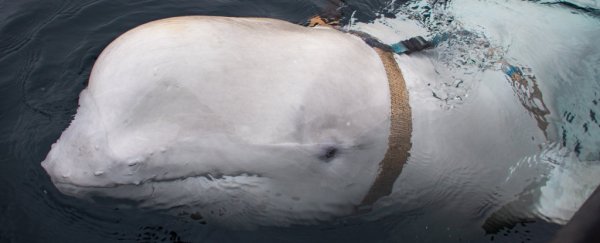A strange encounter between fishermen and a mysteriously geared-up white beluga whale in the Barents Sea off the coast of Norway has raised suspicions the animal might be a trained recruit from a Russian military facility.
The whale (Delphinapterus leucas), which was discovered near the island of Ingøya in Arctic Norway, appeared tame and well-adapted to the presence of humans, and approached the fishing vessels without hesitation.
"We were going to put out nets when we saw a whale swimming between the boats," fisherman Joar Hesten told Norwegian broadcaster NRK last week.
"It came over to us, and as it approached, we saw that it had some sort of harness on it."
 (Norwegian Directorate of Fisheries)
(Norwegian Directorate of Fisheries)
While Hesten had never seen the strangely harnessed whale before, other fishermen in the area had reported sightings of the animal, and the whale's seemingly purposeful interactions with the fishing boats might have even been an attempt to rid itself of the harness tied around it.
"It always searches for boats and people, and then it comes all the way to the boat and tries to rub the straps off," Hesten said.
When the fishermen returned to the area with marine biologists from Norway's Directorate of Fisheries, the whale was lured to the boats with cod fillets; one of the fishermen jumped into the frigid waters in a wetsuit and successfully removed the harness.
The whale's attire – which features a special mount that could be used to attach an action camera like a GoPro or another kind of instrument – had the words "Equipment of St. Petersburg" printed on the inside.
Together with the rest of the paraphernalia, that leads some to suspect the animal could be a lost recruit from a Russian naval facility.
"If this comes from Russia and there is great reason to believe it, then it is not Russian scientists, but rather the navy that has done this," marine ecologist Martin Biuw from the Norwegian Institute of Marine Research told NRK.
 (Norwegian Directorate of Fisheries)
(Norwegian Directorate of Fisheries)
A fellow researcher from the University in Tromsø (UiT), Audun Rikardsen, says neither Norwegian nor Russian scientists would put harnesses on whales like this, and concurs the Russian military is the most probable explanation for the whale's equipment.
"I have been in contact with some Russian researchers and they can confirm that this is nothing they are doing," Rikardsen told Norwegian newspaper VG.
"They tell me that most likely it is the Russian Navy in Murmansk."
While the use of whales as military instruments of surveillance or even potentially as weaponised creatures might seem far-fetched, there is a long history of co-opting marine animals, especially dolphins, for naval purposes, both in the former Soviet Union and in the US.
While some of that history is contentious, recent media reports out of Russia suggest the Putin regime is still interested in training whales, dolphins, and even seals for military purposes.
According to those reports, research at the Murmansk Sea Biology Research Institute in northern Russia at the behest of the Russian navy was looking into methods such as training whales to guard naval bases, even to "assist deepwater divers and if necessary kill any strangers who enter their territory".
Russian scientists have this week confirmed that such research is ongoing, adding further weight to the argument that the white beluga spotted in the Barents Sea could be a lost deserter from such a facility.
"There is an institute in St. Petersburg that cooperates with the military in studying animals for applied purposes, and it works in the Cossack Bay on the Black Sea and in Murmansk," Dmitry Glazov from the AN Severtsov Institute of the Russian Academy of Sciences told the Interfax News Service.
Sadly, wherever this animal came from, if it was a lost recruit from a military research facility as many think, its future on its own is far from certain.
"It was very used to people," marine biologist Jørgen Wiig from the Directorate of Fisheries' Marine Service told VG, "so I do not know if it will manage alone."
